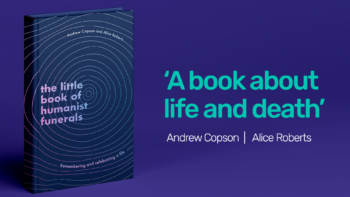If you have experienced the death of a family member or friend and have been asked to read something at their humanist funeral service, it may feel like a daunting task. Maybe you have never been to a humanist ceremony before and are wondering what you should say. This guide should help you feel more comfortable with writing a eulogy for a humanist funeral.

Image by Good Funeral Guide
Humanist funerals offer a personal way to say farewell to someone who has died, without religion. They are rooted in the belief that we have one life only and every person is a unique individual.
The funeral ceremony is led by a celebrant, rather than a religious official, and they often include non religious music and readings, as well as time for reflection.
The celebrant will work with the next of kin to carefully plan the ceremony, write the script and coordinate with all the readers and other participants. On the day, they will lead the funeral ceremony.
Find out more about humanist funerals here.
What is a eulogy?
You may have been asked to ‘say a few words’ or ‘write a eulogy’ at a loved one’s funeral. Giving a eulogy means giving a speech in commemoration of someone’s life. Writing a eulogy is a way of paying tribute to someone you respect or care about. It is also a creative act and something which will be unique to your person and their story.

A humanist eulogy
Humanist funerals are unique and personal ceremonies, chosen because the person who died was not religious or had humanist values. There is no religious content in a humanist ceremony, but secular readings and poems often feature, as well as one or more tributes to the person. A eulogy at a humanist funeral should reflect their unique personality, achievements and values.
The Humanist Funeral Tribute Archive has many examples of eulogies and tributes of people who have chosen a humanist funeral led by a celebrant trained and accredited by Humanists UK.
Ideas for a humanist eulogy
Memories

Reflecting on the time you spend together may bring up fond memories. If you have any photographs it might be good to look through those and have a think about a couple of specific examples which you would like to share. People often appreciate a more lighthearted story and one that reflects the personality of the person who has died. You can include some personal thoughts on your story, reflecting on how they made you feel. If you have any memories which include other people who are attending the ceremony, it may be a nice element to mention them. If you’re a close friend, do keep in mind that family will be there: it might be a good idea to keep any stories that the person would rather not have shared just between you and your friends.
Highlights
You could talk about some details of key life events, how you remember when they went to university, got married, had a child. If your friend or family member was passionate about their work then it could be good to highlight their work history and achievements, or focus on their interests, like talking about their favourite film or how they loved to bake. You could include any values they felt passionate about.
Poetry

Poetry can bring comfort to many people and it often features in funeral ceremonies. You may already have a poem in mind or you may know that your friend or relative had a favourite poet whose work you would like to read. While every humanist funeral is unique, some poems are firm favourites:
Uplifting and humorous poems for a humanist funeral
Words that you would use to describe the person
If sharing a memory seems daunting, a good place to start is to write a list of words you associate with the person. This might help form a speech about the kind of person they were or it could remain as a meaningful list of words.
Quotes from a film or song
If they had a particular favourite film series, or maybe there was a film that you went to see together, there might be a fitting quote from one of these movies that you would like to share. Perhaps they had a favourite band or singer who meant a lot to them and reciting part of a song may be a fitting tribute to that person.

Speak to the humanist celebrant
If you have written your speech and you still have concerns about your eulogy fitting into a humanist funeral, you can work with the celebrant leading the funeral. They will be able to offer support with writing the eulogy if you need it, and offer suggestions.
The Little Book of Humanist Funerals
If you would like a wider range of readings to choose from, and also to find out more about what makes a humanist funeral, you can now order The Little Book of Humanist Funerals. The book is peppered with quotes, stories, and meditations, from humanist writers and thinkers throughout the ages, and from our Humanists UK celebrants too.
The Little Book of Humanist Funerals offers great inspiration on how to commemorate the life of a loved one and also invites readers to begin thinking about mortality, death, dying, and grief.
This may be your first humanist funeral but what we do isn’t new: members of Humanists UK members were conducting humanist funerals as long ago as 1896.






